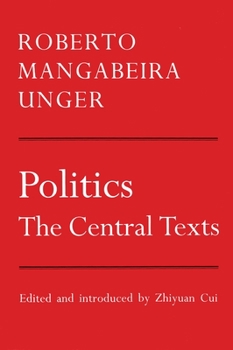Politics: The Central Texts
Select Format
Select Condition 
Book Overview
This selection of key texts from Roberto Mangabeira Unger's three-volume Politics presents an explanatory theory of society and a program for social reconstruction as a radical alternative to Marxism and social democracy. The explanatory part of the work rejects the search for a lawlike science of society and history, and emphasizes the haphazardness and replaceability of existing social arrangements. Unger shows how such an antideterministic approach can inspire surprising explanations of past and present institutions, with the result that our sense of the possible is both broadened and refined. He then shows how we can rebuild our political, economic, and social institutions, making them more faithful to the experimental nature of democracy. The consequence is to redefine the focus for ideological debate and institutional innovation throughout the world, in developed and developing countries alike. With an introduction that locates Unger's work in the history of politics and social theory and explores its major themes, this selection will confirm Geoffrey Hawthorn's description of Politics as "the most powerful social theory of the second half of the twentieth century."
Format:Paperback
Language:English
ISBN:1859841317
ISBN13:9781859841310
Release Date:April 1997
Publisher:Verso
Length:482 Pages
Weight:1.50 lbs.
Dimensions:1.4" x 6.1" x 9.2"
Customer Reviews
1 rating
the future is an open project
Published by Thriftbooks.com User , 27 years ago
Robeto Unger's 'Politics', written earlier than Francis Fukuyama's much hyped 'The End of History and The Last Man',as also, earlier than the final collapse of the of the Soviet Union in 1991, is at once a statement of the alternatives to Soviet communism and a proto-critque of postmodern pessimism epitomized by Fukuyama.In the books comprising 'Politics', Unger offers a convincing critique of the claims to scientism of both Marxism and positivism, by showing the patched up character of history. He shows that to types of constraints, both modifiable in different degrees operate in history, viz., the institutional and imaginative frameworks of society. The latter are more flexible than the former. However, even in the face of constraints of the former kind, the range of historical options is not as limited as is generally assumed. Unger shows that by regarding the society as an artifact and through a marriage of liberalism and Marxism, both of which have more in common than was previously thought, one can open up hitherto unexplored historcal possibilities of radical transformative practice.





